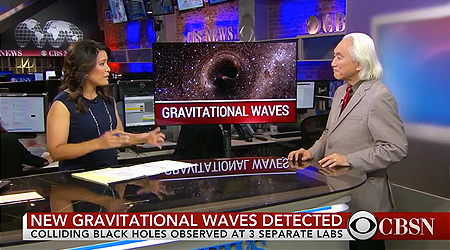 All Entries Tagged With: "telescope"
All Entries Tagged With: "telescope"
KAKU ON JWST DISCOVERIES


The James Webb Space Telescope (JWST) just revealed six massive galaxies that scientists previously thought could not exist. These findings have the potential to shatter our scientific understanding of the universe. Physicist/Futurist, Dr. Michio Kaku, author of the bestselling book, THE GOD EQUATION: The Quest for a Theory of Everything appeared on NBC News NOW with Gadi Schwartz to discuss these groundbreaking discoveries plus new scientific revelations here on Earth. WATCH NOW!
KAKU ON FIRST BLACK HOLE IMAGE

Researchers at the National Science Foundation used a global network of space telescopes to capture the historic first image of a supermassive black hole and its shadow more than 55 million light-years away from Earth. CBS NEWS science and futurist contributor, Dr. Michio Kaku, joins CBSN to discuss the landmark announcement from a studio in Seattle, where Kaku was visiting for his U.S. book tour to promote the paperback release of his national bestseller, THE FUTURE OF HUMANITY: Our Destiny in the Universe. Click to WATCH NOW!
KAKU ON SEARCH FOR EARTHLIKE PLANETS

 Just days from launch, NASA‘s TESS (Transiting Exoplanet Survey Satellite) will embark on a two-year all-sky transit survey of our solar neighborhood and monitor over 200,000 bright stars in search of exoplanets. The endeavor is expected to reveal and identify thousands of previously unknown worlds, some of which may be Earth-like and therefore capable of supporting intelligent life. The ramifications of what we may find are simply staggering and stand to challenge our entire understanding of our place in the universe. CBS News science and futurist contributor, Dr. Michio Kaku joins ‘CBS This Morning: Saturday’ to discuss the TESS mission and other recent findings that seem to suggest we’re not alone. WATCH NOW!
Just days from launch, NASA‘s TESS (Transiting Exoplanet Survey Satellite) will embark on a two-year all-sky transit survey of our solar neighborhood and monitor over 200,000 bright stars in search of exoplanets. The endeavor is expected to reveal and identify thousands of previously unknown worlds, some of which may be Earth-like and therefore capable of supporting intelligent life. The ramifications of what we may find are simply staggering and stand to challenge our entire understanding of our place in the universe. CBS News science and futurist contributor, Dr. Michio Kaku joins ‘CBS This Morning: Saturday’ to discuss the TESS mission and other recent findings that seem to suggest we’re not alone. WATCH NOW!
KAKU ON NEUTRON STAR GOLD

 Astronomers struck gold this week, in more ways than one. For the first time, LIGO scientists have caught two neutron stars in the act of colliding — revealing that these cosmic smashups are the source of heavy elements like gold and platinum. The discovery was made by the same pioneering team that won this year’s Nobel Prize for its discovery of gravitational waves, once theorized and predicted by Albert Einstein. Famed futurist and theoretical physicist, Dr. Michio Kaku, joins Kennedy on FOX Business with more insights. WATCH NOW!
Astronomers struck gold this week, in more ways than one. For the first time, LIGO scientists have caught two neutron stars in the act of colliding — revealing that these cosmic smashups are the source of heavy elements like gold and platinum. The discovery was made by the same pioneering team that won this year’s Nobel Prize for its discovery of gravitational waves, once theorized and predicted by Albert Einstein. Famed futurist and theoretical physicist, Dr. Michio Kaku, joins Kennedy on FOX Business with more insights. WATCH NOW!
KAKU ON NEWEST GRAVITY WAVES

Early last year, scientists made a breakthrough discovery of gravitational waves in the wild, signaling the dawn of a new subfield of astronomy. This week, separate observatories in Washington, Louisiana, and Italy independently detected and collectively confirmed more gravitational waves in the wild — this time from the collision of two black holes about 2 billion light-years from Earth. Gravity waves pick up cosmic events that are invisible or nearly impossible to measure by any other means. By combining observations of a single event using multiple means, it’s now possible to gain a more complete understanding of the source’s properties than ever before. This method is called multi-messenger astronomy. CBS NEWS science and futurist contributor, Dr. Michio Kaku, joins CBSN to break down what this discovery means for the future of astronomy. WATCH NOW!
KAKU ON CLOSE CALL WITH ASTEROID

 Earth will have a close encounter today with a massive asteroid nicknamed "The Rock" by NASA, which first noticed it three years ago. "The Rock" is the largest such object to pass so close to Earth since 2004. CBS News science and futurist contributor Dr. Michio Kaku joins ‘CBS This Morning’ to discuss how the asteroid will not affect us now but underscores the looming dangers of other space objects headed our way. WATCH NOW!
Earth will have a close encounter today with a massive asteroid nicknamed "The Rock" by NASA, which first noticed it three years ago. "The Rock" is the largest such object to pass so close to Earth since 2004. CBS News science and futurist contributor Dr. Michio Kaku joins ‘CBS This Morning’ to discuss how the asteroid will not affect us now but underscores the looming dangers of other space objects headed our way. WATCH NOW!
The Telescope: 400 Years and Counting
Quick — name the invention that has done most to redefine our place in the universe. Hint: This invention was also the most seditious, blasphemous instrument of all time, shaking the very foundations of society. The answer, if you haven’t already guessed it, is the telescope. Read the WIRED.com article “The Telescope: 400 Years and Counting”












